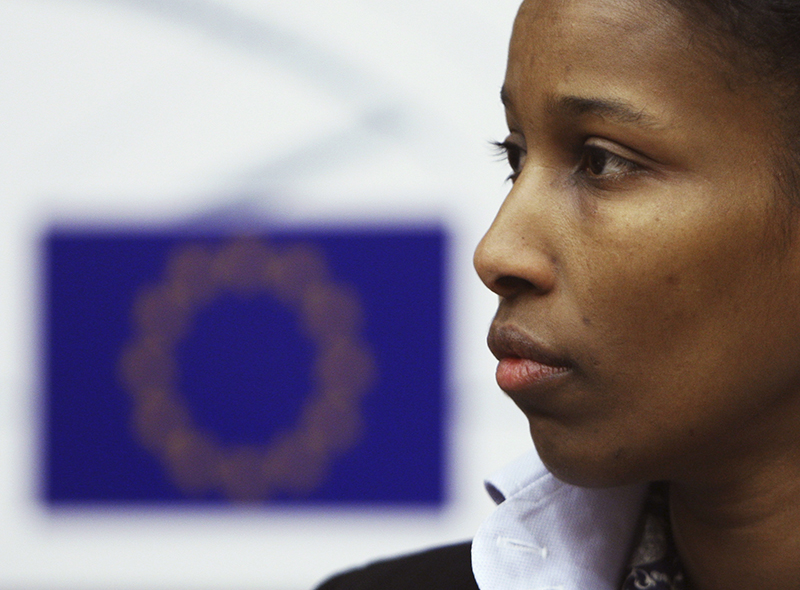Ayaan Hirsi Ali’s tale provides cover for US-led wars
By Usaid Siddiqui
Religion News Service

Ayaan Hirsi Ali looks on as she arrives at the European Parliament in Brussels on Feb. 14, 2008. Photo courtesy of Francois Lenoir / Reuters
Controversial American author Ayaan Hirsi Ali has been a regular fixture on major news networks lately, discussing her most recent book, “Heretic,” as well as her views on various issues that include violence in Islam and the treatment of Muslim women.
An ex-Muslim, Hirsi Ali began her rise to fame with her book “Infidel,” which documented her hardships growing up as a Muslim woman in her native Somalia. In light of her turbulent past, Hirsi Ali has gained strong following in the West. Prominent atheist author Richard Dawkins has called her a “hero for rationalism and feminism.” Now, after the release of “Heretic,” some are again cheering her as a brave champion for women’s rights, especially for Muslim women.
While many in the West have been receptive to her case, Hirsi Ali’s vicious attacks on Islam and her support for the war on terror, fought mainly in Muslim countries, have left her with few friends among Muslims, including women. Hirsi Ali once famously called Islam a “nihilistic cult of death,” and she has advocated for a war with Islam.
Many examples of brave Muslim women exist in the Muslim world, yet it is not surprising that Hirsi Ali, regardless of her dangerous assertions, has stolen the limelight. As the American government continues to indulge in the war on terror, Hirsi Ali’s story makes her the perfect candidate to provide validation for the atrocities committed by the U.S., from Somalia to Pakistan.
The war on terror
The war on terror is largely a bipartisan issue. But media personalities, especially neoconservatives, have rushed to Hirsi Ali’s defense. Seemingly ever ready for war in the post-9/11 era, they look to Hirsi Ali’s views to help legitimize their own anti-Islam bias and imperialist ambitions.
It is no surprise, then, that she is a fellow at the American Enterprise Institute, which has consistently tried to foster antagonistic relations between the U.S. and the Muslim world.
The liberal media, which have provided a more balanced view on Islam, also sympathize with Hirsi Ali’s detrimental views, especially in its simplistic portrayals of women in the Islamic world.
In 2010, Time magazine carried on its cover a picture of an Afghan woman with her nose cut off, allegedly by the Taliban, with the headline “What happens if we leave Afghanistan?” The article argued that any peace between the Taliban and the U.S. would severely dash hopes for the women of Afghanistan.
Hirsi Ali’s story provides the best cover to masquerade the detrimental politicking of the mainstream Western press.
“While she has brought attention to oppression that some Muslim women face, she has done so by simplistically blaming Islam,” wrote Evelyn Alsultany of the University of Michigan on Hirsi Ali’s precarious logic.
According to Alsultany, “This idea has serious consequences. … It has provided justification for the U.S. to invade Afghanistan and Iraq that has negatively impacted the lives of Muslim women through war.”
Muslim women operating within the confines of the Muslim world have been some the fiercest critics of the war on terror, alleging that their efforts have been hampered by the war, which only provides refuge to puppet governments in cahoots with the West.
Muslim voices against U.S.-led wars
Malalai Joya, an Afghan activist and former member of Parliament, has been an invigorating voice for women in that war-torn nation.
Living under the Taliban during the late ’90s and early ’00s, Joya undertook a mission to educate young girls, a step she knew could land her a beating and possibly death.
In a scathing op-ed, she accused the American-propped government of using Islam to subdue women’s rights in the country.
“How can anyone, man or woman, enjoy basic freedoms when living under the shadow of warlords … and it is now trying to use the country’s Islamic law as a tool with which to limit women’s rights,” she wrote.
In a country where women face severe pressures, it took immense courage to openly condemn a corrupt and despotic government for misusing religion.
But she saved some of her fiercest critique for the occupation forces, which Hirsi Ali championed as liberators of Afghan women.
For Joya, the occupations “make it a much harder fight for justice and peace.”
To her, the idea of women empowerment by U.S. or NATO forces is a joke.
“The situation of women in Afghanistan was used as an excuse for the U.S. and NATO to occupy our country,” Joya said. “But it is clear they were not fighting on behalf of women, because they have put into power the reactionary warlords who are sworn enemies of women.”
A devastating report by the Physicians for Social Responsibility concluded that as many as 1.3 million people have been killed in the “war on terror” and the number could be as high as 2 million, with scores of women and children among the casualties.
For some media outlets, Joya is a bitter pill. Any dissenting voice that would serve to undermine the devastating American-led war of the past 13 years must seem like appeasing the Taliban or ISIS. Hence, so long as the Americans expand their detrimental call for war in Muslim nations, Hirsi Ali’s place as an “informed” voice on Islam is secure.
Editor’s note: Usaid Siddiqui is a freelance writer living in Canada. He has written on current affairs for publications including Al-Jazeera America, PolicyMic and Mondoweiss. His views are his own.
17-17















2015
1,047 views
views
0
comments